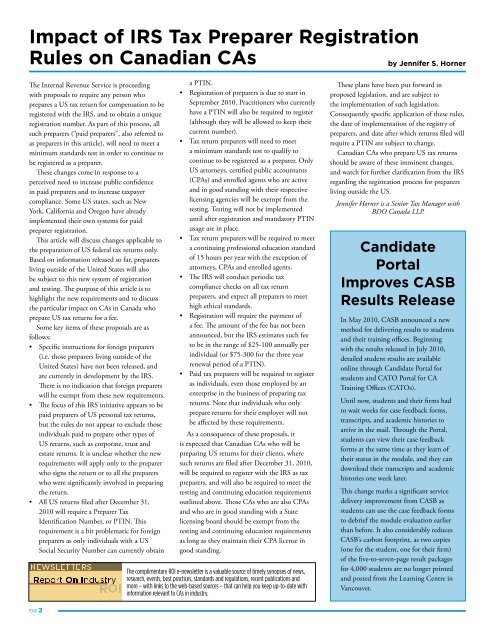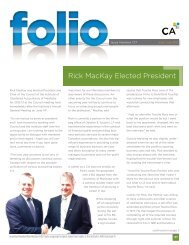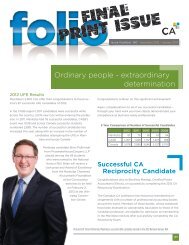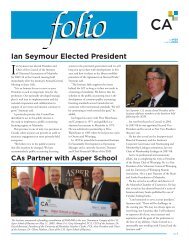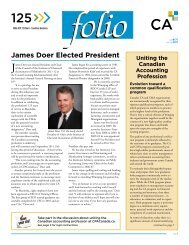Doug Tkach Elected President - The Institute of Chartered ...
Doug Tkach Elected President - The Institute of Chartered ...
Doug Tkach Elected President - The Institute of Chartered ...
You also want an ePaper? Increase the reach of your titles
YUMPU automatically turns print PDFs into web optimized ePapers that Google loves.
Impact <strong>of</strong> IRS Tax Preparer Registration<br />
Rules on Canadian CAs by Jennifer S. Horner<br />
<strong>The</strong> Internal Revenue Service is proceeding<br />
with proposals to require any person who<br />
prepares a US tax return for compensation to be<br />
registered with the IRS, and to obtain a unique<br />
registration number. As part <strong>of</strong> this process, all<br />
such preparers (“paid preparers”, also referred to<br />
as preparers in this article), will need to meet a<br />
minimum standards test in order to continue to<br />
be registered as a preparer.<br />
<strong>The</strong>se changes come in response to a<br />
perceived need to increase public confidence<br />
in paid preparers and to increase taxpayer<br />
compliance. Some US states, such as New<br />
York, California and Oregon have already<br />
implemented their own systems for paid<br />
preparer registration.<br />
This article will discuss changes applicable to<br />
the preparation <strong>of</strong> US federal tax returns only.<br />
Based on information released so far, preparers<br />
living outside <strong>of</strong> the United States will also<br />
be subject to this new system <strong>of</strong> registration<br />
and testing. <strong>The</strong> purpose <strong>of</strong> this article is to<br />
highlight the new requirements and to discuss<br />
the particular impact on CAs in Canada who<br />
prepare US tax returns for a fee.<br />
Some key items <strong>of</strong> these proposals are as<br />
follows:<br />
• Specific instructions for foreign preparers<br />
(i.e. those preparers living outside <strong>of</strong> the<br />
United States) have not been released, and<br />
are currently in development by the IRS.<br />
<strong>The</strong>re is no indication that foreign preparers<br />
will be exempt from these new requirements.<br />
• <strong>The</strong> focus <strong>of</strong> this IRS initiative appears to be<br />
paid preparers <strong>of</strong> US personal tax returns,<br />
but the rules do not appear to exclude those<br />
individuals paid to prepare other types <strong>of</strong><br />
US returns, such as corporate, trust and<br />
estate returns. It is unclear whether the new<br />
requirements will apply only to the preparer<br />
who signs the return or to all the preparers<br />
who were significantly involved in preparing<br />
the return.<br />
• All US returns filed after December 31,<br />
2010 will require a Preparer Tax<br />
Identification Number, or PTIN. This<br />
requirement is a bit problematic for foreign<br />
preparers as only individuals with a US<br />
Social Security Number can currently obtain<br />
FOLIO 2<br />
a PTIN.<br />
• Registration <strong>of</strong> preparers is due to start in<br />
September 2010. Practitioners who currently<br />
have a PTIN will also be required to register<br />
(although they will be allowed to keep their<br />
current number).<br />
• Tax return preparers will need to meet<br />
a minimum standards test to qualify to<br />
continue to be registered as a preparer. Only<br />
US attorneys, certified public accountants<br />
(CPAs) and enrolled agents who are active<br />
and in good standing with their respective<br />
licensing agencies will be exempt from the<br />
testing. Testing will not be implemented<br />
until after registration and mandatory PTIN<br />
usage are in place.<br />
• Tax return preparers will be required to meet<br />
a continuing pr<strong>of</strong>essional education standard<br />
<strong>of</strong> 15 hours per year with the exception <strong>of</strong><br />
attorneys, CPAs and enrolled agents.<br />
• <strong>The</strong> IRS will conduct periodic tax<br />
compliance checks on all tax return<br />
preparers, and expect all preparers to meet<br />
high ethical standards.<br />
• Registration will require the payment <strong>of</strong><br />
a fee. <strong>The</strong> amount <strong>of</strong> the fee has not been<br />
announced, but the IRS estimates such fee<br />
to be in the range <strong>of</strong> $25-100 annually per<br />
individual (or $75-300 for the three year<br />
renewal period <strong>of</strong> a PTIN).<br />
• Paid tax preparers will be required to register<br />
as individuals, even those employed by an<br />
enterprise in the business <strong>of</strong> preparing tax<br />
returns. Note that individuals who only<br />
prepare returns for their employer will not<br />
be affected by these requirements.<br />
As a consequence <strong>of</strong> these proposals, it<br />
is expected that Canadian CAs who will be<br />
preparing US returns for their clients, where<br />
such returns are filed after December 31, 2010,<br />
will be required to register with the IRS as tax<br />
preparers, and will also be required to meet the<br />
testing and continuing education requirements<br />
outlined above. Those CAs who are also CPAs<br />
and who are in good standing with a State<br />
licensing board should be exempt from the<br />
testing and continuing education requirements<br />
as long as they maintain their CPA license in<br />
good standing.<br />
<strong>The</strong> complimentary ROI e-newsletter is a valuable source <strong>of</strong> timely synopses <strong>of</strong> news,<br />
research, events, best practices, standards and regulations, recent publications and<br />
more – with links to the web-based sources – that can help you keep up-to-date with<br />
information relevant to CAs in industry.<br />
<strong>The</strong>se plans have been put forward in<br />
proposed legislation, and are subject to<br />
the implementation <strong>of</strong> such legislation.<br />
Consequently specific application <strong>of</strong> these rules,<br />
the date <strong>of</strong> implementation <strong>of</strong> the registry <strong>of</strong><br />
preparers, and date after which returns filed will<br />
require a PTIN are subject to change.<br />
Canadian CAs who prepare US tax returns<br />
should be aware <strong>of</strong> these imminent changes,<br />
and watch for further clarification from the IRS<br />
regarding the registration process for preparers<br />
living outside the US.<br />
Jennifer Horner is a Senior Tax Manager with<br />
BDO Canada LLP.<br />
Candidate<br />
Portal<br />
Improves CASB<br />
Results Release<br />
In May 2010, CASB announced a new<br />
method for delivering results to students<br />
and their training <strong>of</strong>fices. Beginning<br />
with the results released in July 2010,<br />
detailed student results are available<br />
online through Candidate Portal for<br />
students and CATO Portal for CA<br />
Training Offices (CATOs).<br />
Until now, students and their firms had<br />
to wait weeks for case feedback forms,<br />
transcripts, and academic histories to<br />
arrive in the mail. Through the Portal,<br />
students can view their case feedback<br />
forms at the same time as they learn <strong>of</strong><br />
their status in the module, and they can<br />
download their transcripts and academic<br />
histories one week later.<br />
This change marks a significant service<br />
delivery improvement from CASB as<br />
students can use the case feedback forms<br />
to debrief the module evaluation earlier<br />
than before. It also considerably reduces<br />
CASB’s carbon footprint, as two copies<br />
(one for the student, one for their firm)<br />
<strong>of</strong> the five-to-seven-page result packages<br />
for 4,000 students are no longer printed<br />
and posted from the Learning Centre in<br />
Vancouver.


